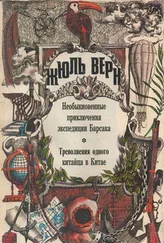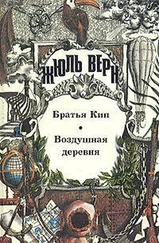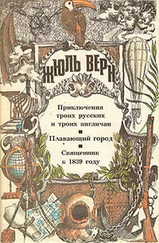"I will tell you why it seems so. If the side of the comet on which we are resident impinges on the earth, it stands to reason that we must be crushed to atoms by the violence of the concussion."
"Regular mincemeat!" said Ben Zoof, whom no admonitions could quite reduce to silence.
"And if," said the lieutenant, after a moment’s pause, and the slightest possible frown at the interruption—"and if the collision should occur at our antipodes, the sudden check to the velocity of the comet would be quite equivalent to a shock in situ ; and, another thing, we should run the risk of being suffocated, for all our comet’s atmosphere would be assimilated with the terrestrial atmosphere, and we, supposing we were not dashed to atoms, should be left as it were upon the summit of an enormous mountain (for such to all intents and purposes Gallia would be), 450 miles above the level of the surface of the globe, without a particle of air to breathe."
"But would not our chances of escape be considerably better," asked Count Timascheff, "in the event of either of the comet’s poles being the point of contact?"
"Taking the combined velocity into account," answered the lieutenant, "I confess that I fear the violence of the shock will be too great to permit our destruction to be averted."
A general silence ensued, which was broken by the lieutenant himself. "Even if none of these contingencies occur in the way we have contemplated, I am driven to the suspicion that we shall be burnt alive."
"Burnt alive!" they all exclaimed in a chorus of horror.
"Yes. If the deductions of modern science be true, the speed of the comet, when suddenly checked, will be transmuted into heat, and that heat will be so intense that the temperature of the comet will be raised to some millions of degrees."
No one having anything definite to allege in reply to Lieutenant Procope’s forebodings, they all relapsed into silence. Presently Ben Zoof asked whether it was not possible for the comet to fall into the middle of the Atlantic.
Procope shook his head. "Even so, we should only be adding the fate of drowning to the list of our other perils."
"Then, as I understand," said Captain Servadac, "in whatever way or in whatever place the concussion occurs, we must be either crushed, suffocated, roasted, or drowned. Is that your conclusion, lieutenant?"
"I confess I see no other alternative," answered Procope, calmly.
"But isn’t there another thing to be done?" said Ben Zoof.
"What do you mean?" his master asked.
"Why, to get off the comet before the shock comes."
"How could you get off Gallia?"
"That I can’t say," replied the orderly.
"I am not sure that that could not be accomplished," said the lieutenant.
All eyes in a moment were riveted upon him, as, with his head resting on his hands, he was manifestly cogitating a new idea. "Yes, I think it could be accomplished," he repeated. "The project may appear extravagant, but I do not know why it should be impossible. Ben Zoof has hit the right nail on the head; we must try and leave Gallia before the shock."
"Leave Gallia! How?" said Count Timascheff.
The lieutenant did not at once reply. He continued pondering for a time, and at last said, slowly and distinctly, "By making a balloon!"
Servadac’s heart sank.
"A balloon!" he exclaimed. "Out of the question! Balloons are exploded things. You hardly find them in novels. Balloon, indeed!"
"Listen to me," replied Procope. "Perhaps I can convince you that my idea is not so chimerical as you imagine." And, knitting his brow, he proceeded to establish the feasibility of his plan. "If we can ascertain the precise moment when the shock is to happen, and can succeed in launching ourselves a sufficient time beforehand into Gallia’s atmosphere, I believe it will transpire that this atmosphere will amalgamate with that of the earth, and that a balloon whirled along by the combined velocity would glide into the mingled atmosphere and remain suspended in mid-air until the shock of the collision is overpast."
Count Timascheff reflected for a minute, and said, "I think, lieutenant, I understand your project. The scheme seems tenable; and I shall be ready to co-operate with you, to the best of my power, in putting it into execution."
"Only, remember," continued Procope, "there are many chances to one against our success. One instant’s obstruction and stoppage in our passage, and our balloon is burnt to ashes. Still, reluctant as I am to acknowledge it, I confess that I feel our sole hope of safety rests in our getting free from this comet."
"If the chances were ten thousand to one against us," said Servadac, "I think the attempt ought to be made."
"But have we hydrogen enough to inflate a balloon?" asked the count.
"Hot air will be all that we shall require," the lieutenant answered; "we are only contemplating about an hour’s journey."
"Ah, a fire-balloon! A montgolfier!" cried Servadac. "But what are you going to do for a casing?"
"I have thought of that. We must cut it out of the sails of the Dobryna ; they are both light and strong," rejoined the lieutenant. Count Timascheff complimented the lieutenant upon his ingenuity, and Ben Zoof could not resist bringing the meeting to a conclusion by a ringing cheer.
Truly daring was the plan of which Lieutenant Procope had thus become the originator; but the very existence of them all was at stake, and the design must be executed resolutely. For the success of the enterprise it was absolutely necessary to know, almost to a minute, the precise time at which the collision would occur, and Captain Servadac undertook the task, by gentle means or by stern, of extracting the secret from the professor.
To Lieutenant Procope himself was entrusted the superintendence of the construction of the montgolfier, and the work was begun at once. It was to be large enough to carry the whole of the twenty-three residents in the volcano, and, in order to provide the means of floating aloft long enough to give time for selecting a proper place for descent, the lieutenant was anxious to make it carry enough hay or straw to maintain combustion for a while, and keep up the necessary supply of heated air.
The sails of the Dobryna , which had all been carefully stowed away in the Hive, were of a texture unusually close, and quite capable of being made airtight by means of a varnish, the ingredients of which were rummaged out of the promiscuous stores of the tartan. The lieutenant himself traced out the pattern and cut out the strips, and all hands were employed in seaming them together. It was hardly the work for little fingers, but Nina persisted in accomplishing her own share of it. The Russians were quite at home at occupation of this sort, and having initiated the Spaniards into its mysteries, the task of joining together the casing was soon complete. Isaac Hakkabut and the professor were the only two members of the community who took no part in this somewhat tedious proceeding.
A month passed away, but Servadac found no opportunity of getting at the information he had pledged himself to gain. On the sole occasion when he had ventured to broach the subject with the astronomer, he had received for answer that as there was no hurry to get back to the earth, there need be no concern about any dangers of transit.
Indeed, as time passed on, the professor seemed to become more and more inaccessible. A pleasant temperature enabled him to live entirely in his observatory, from which intruders were rigidly shut out. But Servadac bided his time. He grew more and more impressed with the importance of finding out the exact moment at which the impact would take place, but was content to wait for a promising opportunity to put any fresh questions on the subject to the too reticent astronomer.
Читать дальше
![Жюль Верн Off on a Comet [Hector Servadac] обложка книги](/books/30131/zhyul-vern-off-on-a-comet-hector-servadac-cover.webp)










![Жюль Верн - Властелин мира [сборник]](/books/407848/zhyul-vern-vlastelin-mira-sbornik-thumb.webp)
